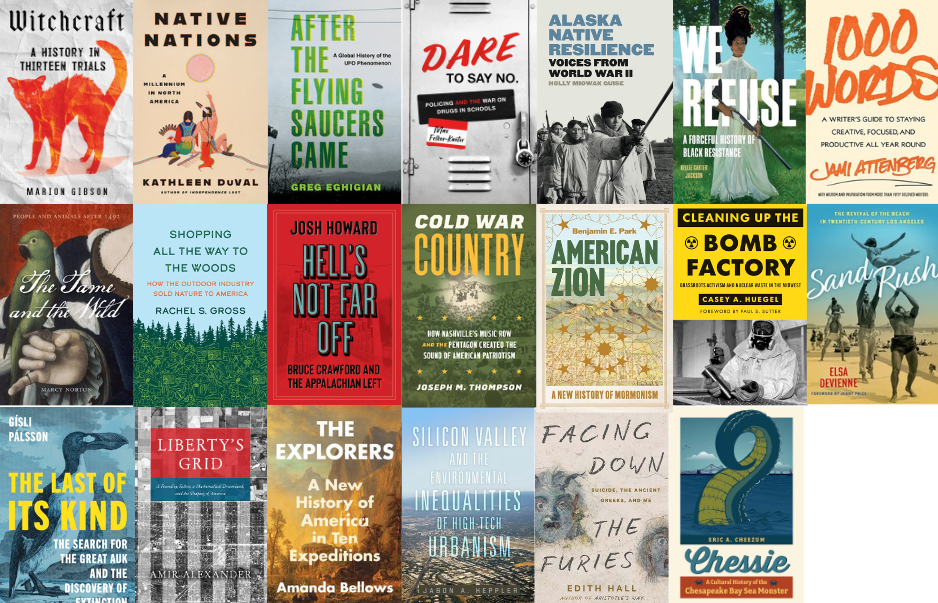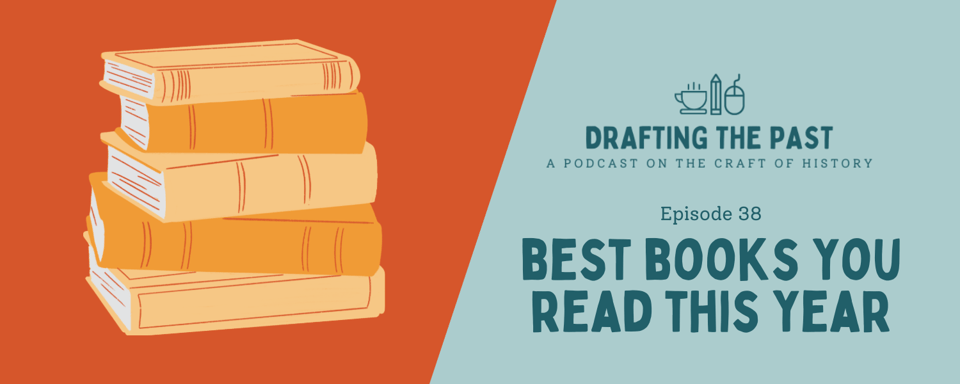What I Can't Wait to Read
The history books I'm most looking forward to in the first half of 2024.

The Drafting the Past newsletter is free to all. If you would like to help keep the podcast and newsletter going, you can support Drafting the Past on Patreon.
History Books I Can't Wait to Read in the First Half of 2024
Listen, new year's resolutions are fine. End-of-year book lists are great. But I'm ready to focus on what I'm excited to read, rather than what I want to fix about myself, in the coming year.
Below, I've listed 20 of the history books I'm most looking forward to in the first six months of 2024. Some obvious caveats: this list is a little arbitrary, reflects my specific—and sometimes esoteric—tastes, and in no way represents all of the books I'm looking forward to through June. I'm sure there are others I don't even know about yet!
Some of these will be featured on upcoming episodes of Drafting the Past, and some are just for fun. What are you looking forward to reading this year? Reply and let me know.

January
1000 Words, Jami Attenberg (Simon and Schuster, January 9)
OK, I'm cheating right off the bat, because this isn't a history book at all. It's a writing craft book. While I'm a sucker for craft books generally, I'm especially excited about this one, based on Attenberg's wildly popular #1000WordsofSummer project (learn more in her newsletter). I've found Attenberg's encouragement to be a balm when I need it, and I pre-ordered this one as soon as it was available.
The Tame and the Wild: People and Animals After 1492, Marcy Norton (Harvard University Press, January 9)
As an environmental historian, I'm drawn to more-than-human histories. This one, which re-tells the history of early encounters between European colonizers and Indigenous Americans with wildlife and livestock at the center, intrigues me.
American Zion: A New History of Mormonism, Benjamin E. Park (W. W. Norton, January 16)
I grew up in a part of the country where Mormonism is a prominent religion, and its history—especially as it intertwines with American history—fascinates me. I've started reading this one ahead of a podcast interview with Park, and I can already tell you that it's a great read.
Witchcraft: A History in Thirteen Trials, Marion Gibson (Scribner, January 16)
This is out of my usual reading and research fare, but it looks fascinating. It was published in the UK last year and has gotten some great reviews, and my interest was piqued by its global and temporal breadth. I'm embarrassingly easily hooked by the [X]: A History in [Number][Y] narrative structure. The combination of big topic and specific examples doesn't always work, but when it does it's one of my favorites.
February
The Last of Its Kind: The Search for the Great Auk and the Discovery of Extinction, Gísli Pálsson (Princeton University Press, February 6)
This hits the intersection of my interests in environmental history and history of science, and the press's description of its "richly evocative narrative" didn't hurt. Neither did blurbs from Elizabeth Kolbert and Michelle Nijhuis.
March
Hell’s Not Far Off: Bruce Crawford and the Appalachian Left, Josh Howard (West Virginia University Press, March 1)
Before WVU fell victim to hatchet consultants and lost WVU Press director Derek Krissoff in the process, the press was punching well above its weight. I suspect this book hails from that earlier happy time, and it looks like a promising biography of an overlooked figure.
Facing Down the Furies: Suicide, the Ancient Greeks, and Me, Edith Hall (Yale University Press, March 19)
I love it when an author combines history with a deeply personal narrative (see also Lulu Miller's Why Fish Don't Exist). Here's the tagline for this one, which drew me in immediately: " An award-winning classicist turns to Greek tragedies for the wisdom to understand the damage caused by suicide and help those who are contemplating suicide themselves."
Shopping All the Way to the Woods: How the Outdoor Industry Sold Nature to America, Rachel S. Gross (Yale University Press, March 26)
I have a hunch this one's going to become required reading for environmental historians, and I'm looking forward to it. Gross looks at how American consumer culture and the enjoyment of nature are paradoxically—but inextricably—linked.
April
Alaska Native Resilience: Voices from World War II, Holly Miowak Guise (University of Washington Press, April 2024)
Miowak Guise's work is so much more than just a book. Her community-based research efforts to collect and preserve the stories of Alaska Native elders and veterans has also resulted in a moving digital project and YouTube channel. I'm looking forward to seeing how she brings this research together here.
DARE to Say No: Policing and the War on Drugs in Schools, Max Felker-Kantor (UNC Press, April 2)
As a product of the DARE era of anti-drug messaging, I'm eager to read this first history of the program. If you want a sneak peek, check out Felker-Kantor's recent piece in Slate, "The DARE Snitches."
Cold War Country: How Nashville’s Music Row and the Pentagon Created the Sound of American Patriotism, Joseph M. Thompson (UNC Press, April 2)
I love a history that explores the relationships between popular culture and politics, and this one looks promising, especially as Nashville grapples with its political identity today.
Sand Rush: The Revival of the Beach in Twentieth-Century Los Angeles, Elsa Devienne (Oxford University Press, April 4)
Environmental histories of sites of leisure always interest me, especially in the American West. This book, looks like an excellent entry in this genre (an earlier version of the book was first published in French, believe it or not). Plus, it has an introduction by Jenny Price, one of my historian heroes!
Native Nations: A Millennium in North America, Kathleen DuVal (Penguin Random House, April 9)
DuVal is a brilliant historian, and this sweeping history of a millennium of Indigenous North America shows how Native cultures and governments grew, transformed, adapted, and persisted before, during, and after European colonization.
Silicon Valley and the Environmental Inequalities of High-Tech Urbanism, Jason Heppler (University of Oklahoma Press, April 23)
I've been looking forward to reading this book since I first learned Heppler was working on it. Not only does it speak to my enviro/history of science interests, but it also has personal appeal: my grandparents moved to Santa Clara sixty years ago—my grandfather's job at Lockheed was part of that high-tech urbanism—and in that time watched the landscape transform. I'm eager to read a history of Silicon Valley that focuses on the environmental disparities that its growth created.
Cleaning Up the Bomb Factory: Grassroots Activism and Nuclear Waste in the Midwest, Casey A. Huegel (University of Washington Press, April 30)
This, too, feeds my interest in histories that bring together environmental and scientific histories. As an added bonus, this one is also a Midwestern history, putting it even more squarely in my wheelhouse.
May
Chessie: A Cultural History of the Chesapeake Bay Sea Monster, Eric A. Cheezum (JHU Press, May 21)
I can never get enough of monster and legend cultural histories, so you'd better believe I'm going to gobble this one up. Bonus that it's written by an independent historian!
Liberty’s Grid: A Founding Father, a Mathematical Dreamland, and the Shaping of America, Amir Alexander (University of Chicago Press, May 30)
I'll grant that this is probably not a subject that will appeal to all readers. But for some reason, I am endlessly fascinated by the American gridded landscape system—it even plays a role in my dissertation. I'm looking forward to getting my hands on this account of its creation.
June
After the Flying Saucers Came: A Global History of the UFO Phenomenon, Greg Eghigian (Oxford University Press, June 3)
See above about cultural histories of monsters and legends. Plus, I'm intrigued that this is a global history, promising to explain "what the fascination with flying saucers and extraterrestrial visitors says about our changing views on science, technology, and the paranormal." I want to believe.
The Explorers: A New History of America in Ten Expeditions, Amanda Bellows (William Morrow, June 4)
I told you I'm a sucker for this narrative construction. This one looks like a fun popular history, with opportunities to explore all kinds of American history through the broad lens of "explorers." I suspect it will be a good one for gifts. Plus, it's a small thing, but I love it when I see a woman get to write this kind of big, adventurous history.
We Refuse: A Forceful History of Black Resistance, Kellie Carter Jackson (Seal Press, Hachette, June 4)
A readerly confession: I totally judged this book by its cover. Wouldn't you? It's fantastic, and I think it's just a prelude to a remarkable narrative inside. Carter Jackson is a powerhouse of a historian—writer, podcast host and producer, essayist, media personality and more—and this book expands on her 2020 essay in The Atlantic, "The Double Standard of the American Riot."
Other Notes
- Did you catch the last Drafting the Past episode of the year? In it, readers share the best books they read this year, and they came through with excellent suggestions. Listen now.
- The podcast will be back at the end of January, and I'm busy reading for and recording new episodes now. Have a guest you're itching to hear on the show? Hit reply to tell me about them.
- I'm putting together a post about best practices for pitching the show, so keep an eye out for that soon.
Have a very happy new year, set some motivating but achievable writing goals for yourself, and sleep in a little over the next few days.

Add a comment: